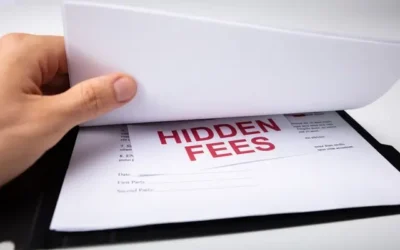Origination Fees
the one percent rule and what is excluded
VA Origination Fees Explained, the 1 Percent Cap
VA origination fees are lender charges for doing the work of the loan, underwriting, processing, and closing coordination. VA rules limit what you can be charged for these lender services using a one percent cap. The key is knowing whether your lender is using a flat one percent fee or itemizing smaller admin fees, and spotting any junk fees that should not be there.
The one percent cap, the maximum allowed
- Cap is one percent: The VA limits lender origination charges to a maximum of one percent of the loan amount for the lender’s administrative work.
- Example math: On a $300,000 loan, one percent is $3,000, so origination style charges should not exceed that amount.
- Not required to charge it: One percent is a ceiling, not a required fee, so some lenders charge less or offset it with pricing.
- Where you see it: Check your Loan Estimate and Closing Disclosure for lender fees and compare to the one percent limit.
Flat fee versus itemized fees, what changes
- Flat one percent approach: A single origination fee can cover lender overhead, and it blocks separate line items like processing and underwriting.
- Itemized approach: If no flat one percent is charged, a lender can itemize admin fees, but the total still must stay within the one percent cap.
- Watch for double charging: A common problem is a flat origination plus separate processing or underwriting fees, which usually should be challenged.
- Ask the simple question: Are you charging flat one percent, or itemized fees, and what is the total of lender admin charges.
Excluded costs, the cap does not cover these
- Third party services: Title, escrow, credit reports, recording, and similar third party charges are not part of the one percent cap.
- VA appraisal: The VA appraisal fee is separate, and the amount varies by location and property type.
- Discount points: Points are optional charges to buy down your rate, and they are separate from lender origination fees.
- Inspection costs: Some inspections are allowed and separate, depending on what is required for the transaction and by whom.
How to reduce what you pay at closing
- Negotiate seller help: Sellers can pay certain costs and concessions, so you can negotiate help that reduces cash to close.
- Use lender credits: You can trade a slightly higher rate for lender credits that cover some of your closing costs.
- Shop lenders: Fees and pricing vary, and some lenders charge less than one percent or structure pricing to reduce upfront cost.
- Compare apples to apples: Compare Loan Estimates on the same day, with the same loan amount and points, so you see the real difference.
FAQs
What is the VA loan origination fee limit?
Can a lender charge one percent and also charge underwriting and processing fees?
Is the VA funding fee the same as the origination fee?
VA origination fees matter because they are the lender controlled part of your closing costs. When you understand the 1% cap on origination fees, what it covers, and what is outside the cap, you stop overpaying and you stop getting surprised at closing. This guide breaks down the rules the way underwriting and closing teams review them, so you can audit your Loan Estimate before you sign anything.
What Are Origination Fees?
VA origination fees are lender charges for processing and underwriting your mortgage. The VA limits what you can be charged for that lender work. You will see the fee in the Loan Costs area of your Loan Estimate, and it should cover the lender’s internal labor, not third party services. The whole point is protecting Veterans from stacked admin charges that show up as underwriting, processing, and document fees.
- It is the lender work bucket: application intake, underwriting, closing coordination, and funding. If the lender charges a flat origination fee, you should not also see separate processing or underwriting line items.
- It is negotiated through pricing: you can pay it out of pocket, ask the seller to cover it, or accept a lender credit in exchange for a higher rate. The right choice depends on your hold period.
- It is not the same as third party fees: title, recording, appraisal, and credit report charges are separate. Those fees can vary by county and provider, so do not judge one lender by those line items.
- It is a leverage point for shopping: the origination section is where lender costs differ the most. If you want a fair comparison, you must standardize loan amount, points, and credits across lenders.
Is There Really a 1 Percent Cap on VA Origination Fees?
Yes, the VA caps lender origination charges at 1% of the loan amount. That cap blocks junk fees on Veterans. The lender can charge a flat 1% fee or itemize permitted lender fees up to the same limit. Third party services are separate, so appraisal and title costs still apply and still vary.
- The flat 1% option is a bundled charge meant to cover lender administrative work. When it is used, lenders should not also charge separate underwriting, processing, document prep, or similar internal fees.
- If the lender does not use a flat fee, they may itemize certain lender fees, but the total lender origination charges still cannot exceed 1%. Itemization should match actual services, not invented add ons.
- The cap applies to lender origination charges, not third party costs. You will still see separate charges for appraisal, title, recording, and other services. Those do not disappear just because the lender is capped.
- The practical check is simple: on a $300,000 loan, lender origination charges should not exceed $3,000. If you see more, the lender must reclassify fees or you should switch lenders.
VBA Circular 26 10 1 Allowable Fees and the One Percent Origination Rule
VA Loan Resources
- Complete VA Loan Guide – Eligibility, core benefits, and how VA mortgages work.
- VA Loan Requirements – Credit, income, and service rules you need to qualify.
- VA Funding Fee Explained – Rates, exemptions, and how to roll it into your loan.
- VA Loan Closing Costs – Typical fees and how sellers can help pay them.
- VA Minimum Property Requirements (MPRs) – What homes must have to pass the VA appraisal.
- Check VA Eligibility – Speak with a VA approved lender to check your VA loan eligibility.
Should You Choose the Flat 1 Percent Fee or Itemized Fees?
It depends. A flat 1% fee is predictable, while itemized fees can be lower. The right choice is whichever produces the lowest lender total on the Loan Estimate for your exact scenario. To compare fairly, hold price, points, and credits constant and focus on how clean the lender fee section is.
| Charging Method | What You Typically See on the Loan Estimate | When It Usually Makes Sense | What to Watch |
|---|---|---|---|
| Flat 1% origination fee | One origination line near 1% and fewer lender admin line items | You want simple review and fewer line item arguments under deadline pressure | Any extra underwriting, processing, or doc fees that look like double charging |
| Itemized lender fees | Several lender lines that add up to less than 1% in total | The lender is competitive and truly charging under the cap for your file | Small internal fees stacking up until you are near the cap anyway |
| Points plus lender fees | Origination charges plus discount points in the same lender fee area | You plan to hold the loan long enough to break even on points | Low origination fees paired with high points that raise total cost |
- Choose flat 1% when you want clean paperwork and fewer surprise add ons. It can also be safer on fast closings where you do not want to debate line items under deadline pressure.
- Choose itemized when the lender is charging well below 1% and the itemization looks reasonable. The risk is death by a thousand cuts, where small internal fees pile up and approach the cap anyway.
- If you see both a flat fee and separate underwriting or processing fees, stop and push back. Under VA rules, that is usually double charging, and it is one of the easiest ways to spot padding.
- Do not decide based on the fee label alone. Compare the total of Section A origination charges plus any lender credits or points, because a lower origination fee can be offset by worse pricing.
VA Pamphlet 26 7 Chapter 8 Borrower Fees and Charges
Which Costs Are Outside the 1 Percent Cap?
The 1% cap applies only to lender origination charges. Third party and prepaid items are outside that limit. You will still pay for the ahome appraisal, title, recording, and escrows, and those numbers vary by county and provider. Discount points are separate because they buy down rate rather than pay for lender labor. Sorting the buckets early keeps you from blaming a lender for costs they do not control.
- Appraisal and credit report costs are separate line items because they pay independent vendors. The VA appraisal must still be ordered on a purchase, and the lender cannot waive it just to make costs look lower.
- Title, escrow, and recording fees are outside the cap and are usually the largest third party bucket. These are often shopable in many states, so you can control cost by comparing title quotes.
- Prepaids and escrows are not lender fees, but they are real cash to close. Homeowners insurance, prepaid interest, and initial escrow deposits can be thousands, so budget for them early.
- Discount points are optional and separate from origination. Points buy down the interest rate, so they change your break even, and they can make a low origination fee look cheap while total cost rises.
How Is the Origination Fee Different From the VA Funding Fee?
Origination fees pay the lender for processing the loan. The VA funding fee is a separate program fee paid to VA. They behave differently in disclosures, negotiation, and financing. Origination is capped at 1% and can be covered with credits, while the funding fee has its own rate chart and exemptions. On purchases, the funding fee is typically the only cost you can finance into the loan balance.
- Origination is negotiated lender pricing, capped by VA at 1% for origination charges. It can be paid by you, covered by seller credits, or offset by a lender credit, depending on the deal structure.
- The funding fee is a VA charge tied to loan type, down payment, and prior use, with exemptions for many eligible borrowers. Most lenders will let you finance it, which increases balance and payment.
- Unlike points, the funding fee is not a pricing choice you shop between lenders. It is set by VA rules. Your lender role is confirming the correct rate and exemption status before closing.
- If you are trying to reduce cash to close, the funding fee can be financed while most other closing costs cannot. That is why we use seller credits and lender credits for the rest.
VA Funding Fee and Closing Cost Rules
How Do You Spot Junk Fees and Duplicate Charges on a VA Loan Estimate?
You spot junk fees by comparing lender charges to the 1% cap and watching for duplicates. The Loan Estimate shows where fees sit before you commit. Most problems are not hidden, they are misclassified. Start with Section A origination charges, then scan for extra underwriting, processing, and doc fees that should already be covered. Then compare the Loan Estimate to the Closing Disclosure to confirm the numbers stayed consistent.
- On the Loan Estimate, add every line in Section A Origination Charges, including points, underwriting, processing, and admin fees. If that total is above 1% of the loan amount, demand a rework before you proceed.
- If the lender is charging a flat 1% fee, look for any extra lender admin fees elsewhere, including document preparation, underwriting, or notary charges. Those are common duplicates that should be removed or reclassified.
- Compare the Loan Estimate to the Closing Disclosure line by line, focusing on lender fees and lender credits. Small fee increases can be legitimate, but big shifts need an explanation and a corrected disclosure before you sign.
- Ask one direct question: is this fee inside the 1% cap or a true third party fee. If they cannot explain it clearly, do not close until it is resolved, because unclear fees become permanent after funding.
CFPB How to Compare Loan Estimates and Origination Charges
How Do You Negotiate or Reduce Origination Costs?
You can lower origination cost by shopping VA lenders and structuring credits. The best plan reduces total cost without draining reserves. Many lenders charge less than 1%, and pricing often matters more than the fee label. Use seller credits for allowable costs, decide on points only after you run break even, and keep finances stable so pricing does not worsen.
- Request Loan Estimates from two to three lenders using the same loan amount, points assumption, and credit profile. In many cases, a lender can charge less than 1%, so shopping is how you capture that discount.
- Use seller credits for closing costs first, then decide whether to pay points. Seller concessions are capped for certain items, but standard closing costs can often be covered, which keeps cash to close lower.
- Consider a lender credit when you need to preserve reserves. A lender credit is paid through a slightly higher rate, so compare the monthly payment increase to the upfront savings and your time in the home.
- Keep your file clean to protect pricing. New debt, new inquiries, or last minute deposits can move you into worse pricing buckets, and that can raise origination costs or points even if approved.
The Bottom Line
VA origination fees are the lender’s compensation for processing and underwriting your loan, and VA caps lender origination charges at 1% to protect Veterans from junk fees. The cap does not mean closing costs disappear, it means lender admin costs must stay controlled and clearly disclosed.
Your job is auditing Section A on the Loan Estimate, making sure a flat 1% fee is not paired with duplicate underwriting or processing charges, and confirming the same structure on the Closing Disclosure.
Keep third party fees in perspective, because title, appraisal, and escrows vary by location and are not part of the cap. Then negotiate like a lender does: shop two to three quotes, compare total lender cost plus points or credits, and choose the option that leaves you with reserves after closing. A cheaper fee is not a win if it drains your cash cushion.
Frequently Asked Questions
What is a VA loan origination fee?
A VA origination fee is what the lender charges for processing and underwriting the mortgage. It covers internal lender work, not third party services. VA limits how much the lender can charge as origination.
Is the VA origination fee always exactly 1 percent?
No. One percent is a maximum cap, not a required charge. Some lenders charge less through competitive pricing. The key is that total lender origination charges should not exceed one percent of the loan amount.
Can a lender charge underwriting and processing fees on top of a flat 1 percent fee?
Usually that is a red flag. If the lender charges a flat one percent origination fee, additional lender admin charges like underwriting or processing often look like double charging. Ask the lender to reclassify or remove duplicates.
Do discount points count toward the one percent cap?
Points are separate from the lender origination cap because they buy down the interest rate. Points can still make your total lender costs higher, so compare total Section A charges and run a break even before paying points.
Can I finance the origination fee into my VA loan?
On most VA purchases, you generally cannot finance closing costs into the loan amount. The typical financeable item is the VA funding fee. Origination fees are usually paid with cash, seller credits, or lender credits.
Can the seller pay my origination fee on a VA loan?
Often yes, if it is structured correctly in the contract as part of seller paid costs or credits. The seller is not required to pay it, but it can be negotiated when appraisal value supports the price and credits.
How do I tell if a fee is lender related or a third party fee?
Look at the Loan Estimate. Lender fees are in Origination Charges, while third party services appear as title, appraisal, recording, and similar items. If the lender cannot explain the category, ask for a corrected disclosure.
What is the difference between an origination fee and the VA funding fee?
Origination fees pay the lender for processing the loan and are capped at one percent. The VA funding fee is a program fee paid to VA and may be financed into the loan. Exemptions can apply for eligible borrowers.
What should I do if my Closing Disclosure shows new lender fees?
Stop and ask for an explanation before you sign. Small changes can happen, but large new lender fees often mean misclassification or a last minute add on. Require the lender to correct the Closing Disclosure if needed.
Should I take a lender credit instead of paying origination costs in cash?
A lender credit can reduce cash to close, but it usually comes with a higher rate. Compare the monthly payment increase to the upfront savings and how long you expect to keep the loan. Protect reserves first.






